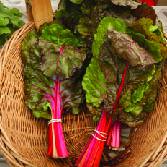

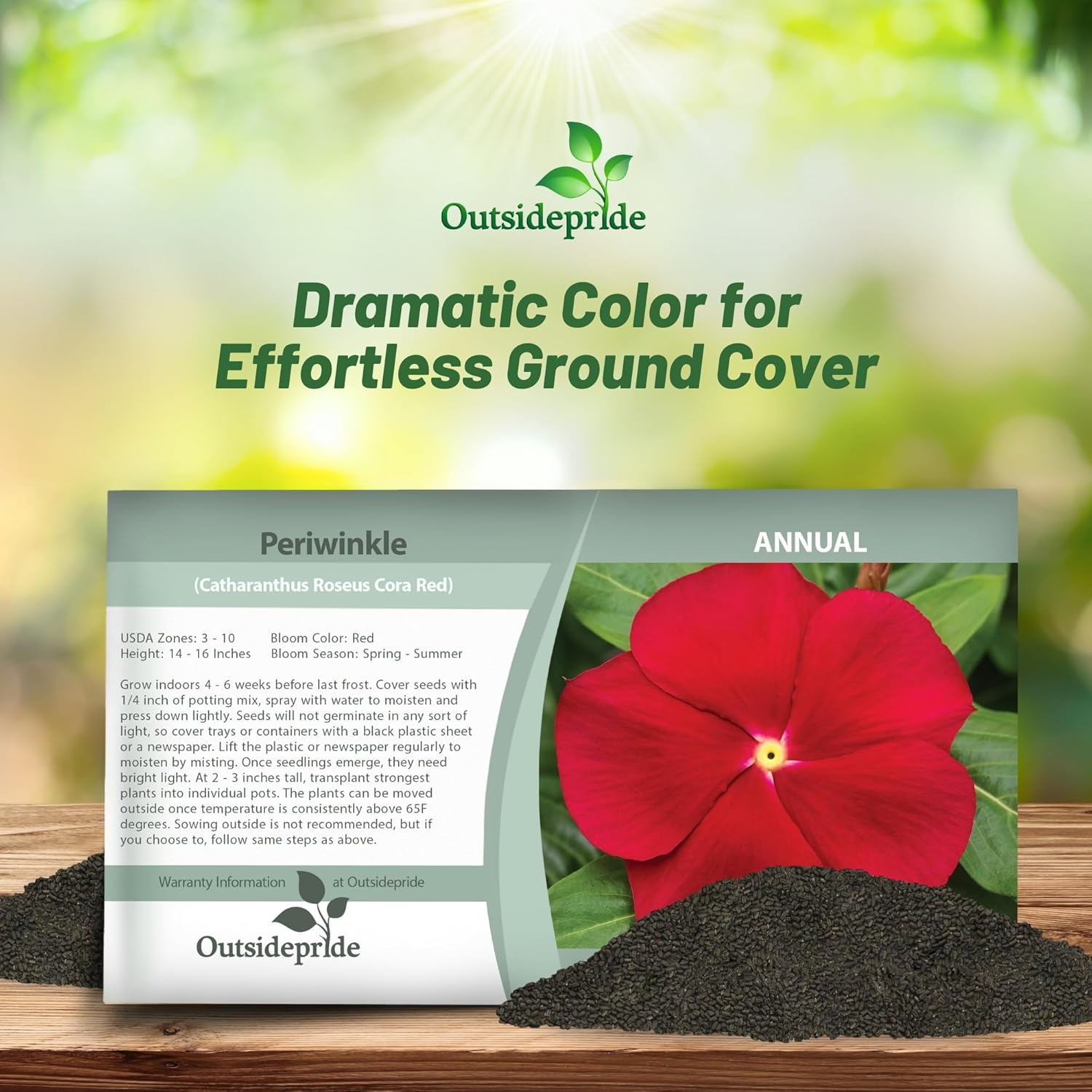

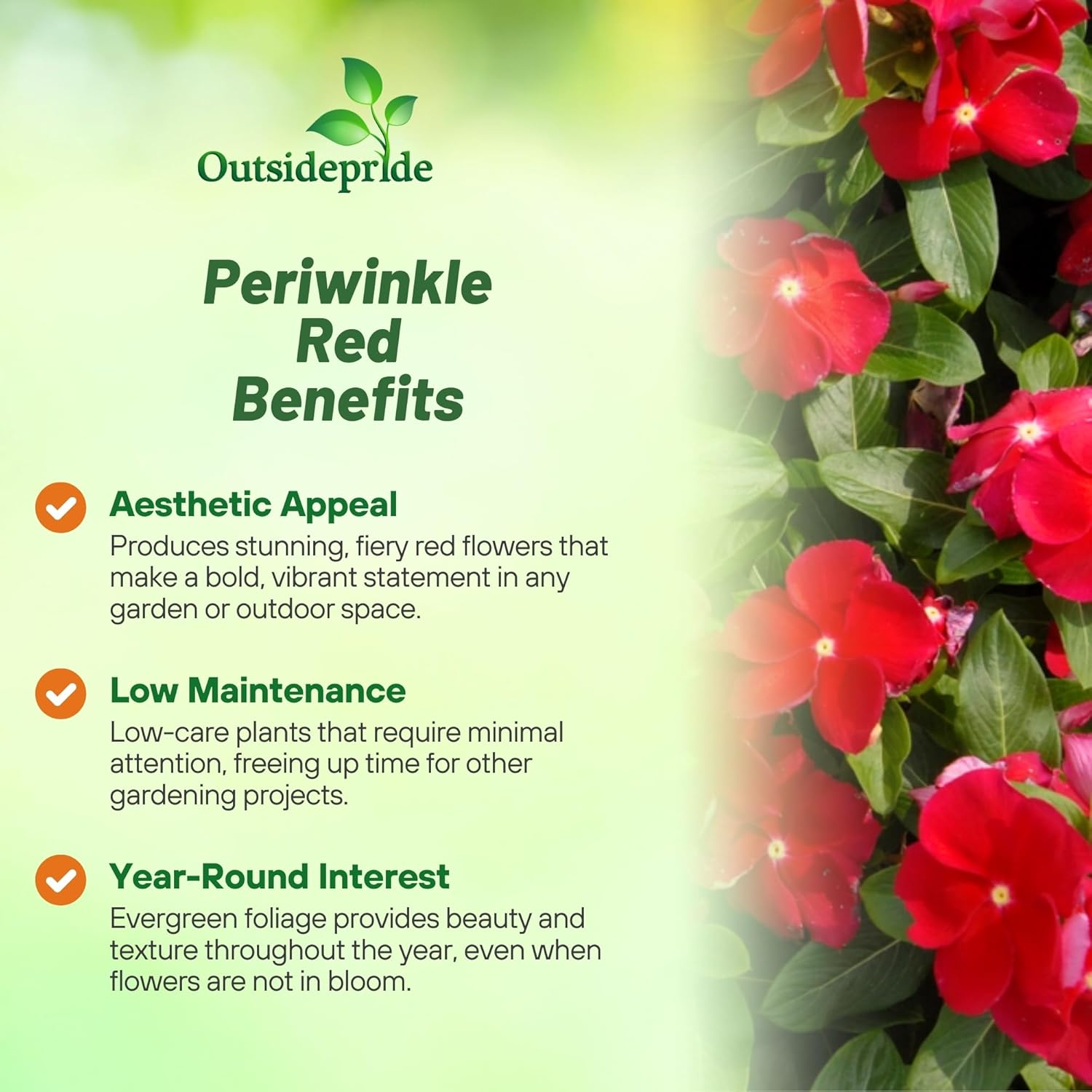
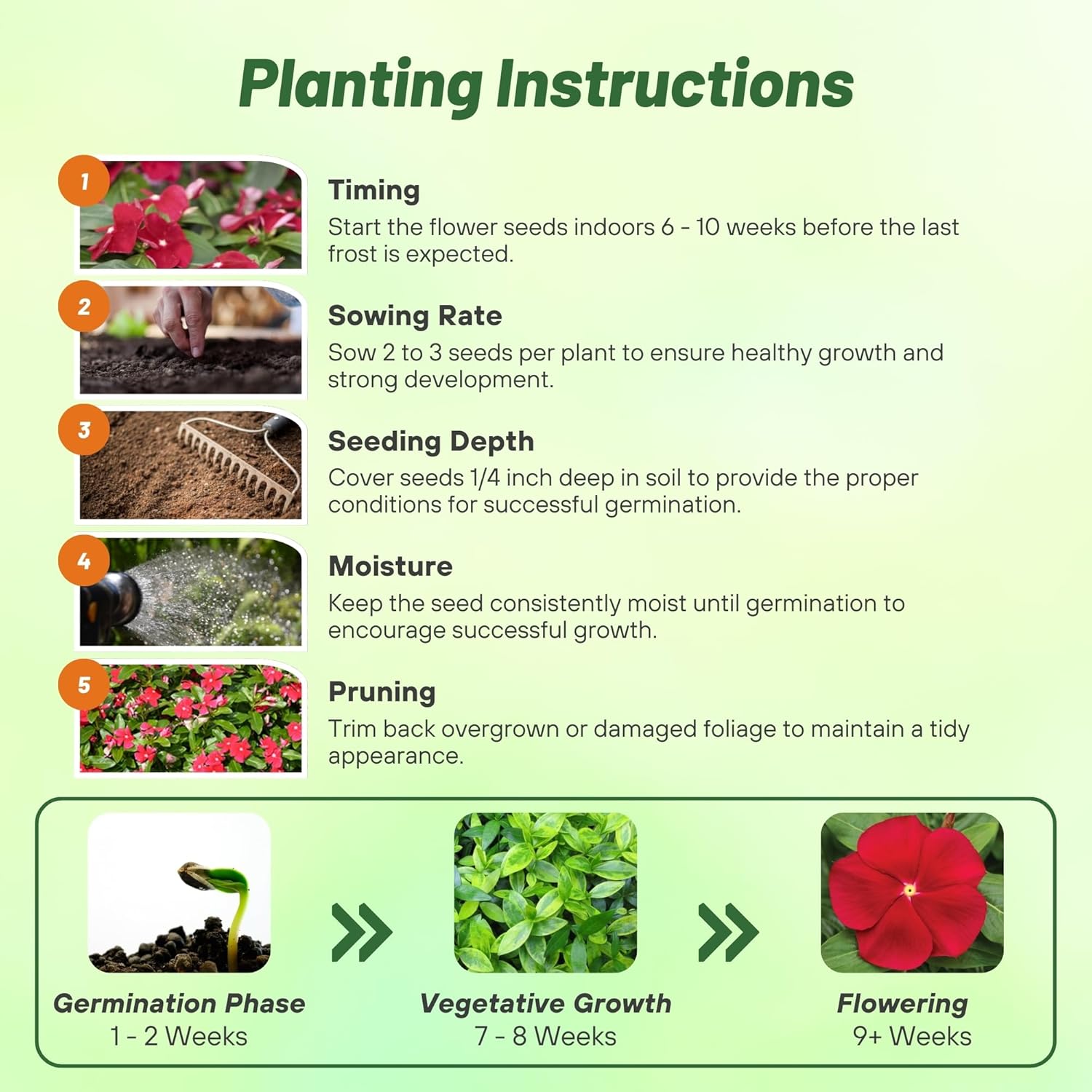



Periwinkle Seeds - Red
SEASON
Annual
USDA ZONES
3 - 10
HEIGHT
14 - 16 inches
WIDTH
18 - 20 inches
BLOOM SEASON
Spring through summer
BLOOM COLOR
Red
GROWTH RATE
Fast
ENVIRONMENT
Full sun
FOOT TRAFFIC
Light
DEER RESISTANT
Yes
SEASON
Annual
USDA ZONES
3 - 10
HEIGHT
8 - 10 inches
WIDTH
24 - 36 inches
BLOOM SEASON
Summer through fall
BLOOM COLOR
Mix
GROWTH RATE
Fast
ENVIRONMENT
Full sun
SOIL TYPE
Moist, well-drained, pH 6.1 - 7.8
DEER RESISTANT
Yes
SEASON
Annual
USDA ZONES
3 - 10
HEIGHT
6 - 8 inches
WIDTH
32 - 36 inches
BLOOM SEASON
Spring through summer
BLOOM COLOR
White
GROWTH RATE
Fast
ENVIRONMENT
Full sun
FOOT TRAFFIC
Light
DEER RESISTANT
Yes
SEASON
Annual
USDA ZONES
3 - 10
HEIGHT
10 - 12 inches
WIDTH
6 - 8 inches
BLOOM SEASON
Late spring to late summer
BLOOM COLOR
Lavender
GROWTH RATE
Fast
ENVIRONMENT
Full sun
FOOT TRAFFIC
Light
DEER RESISTANT
Yes
SEASON
Annual
USDA ZONES
3 - 10
HEIGHT
10 - 12 inches
WIDTH
6 - 8 inches
BLOOM SEASON
Late spring to late summer
BLOOM COLOR
Apricot
GROWTH RATE
Fast
ENVIRONMENT
Full sun
FOOT TRAFFIC
Light
DEER RESISTANT
Yes
SEASON
Annual
USDA ZONES
3 - 10
HEIGHT
10 - 12 inches
WIDTH
6 - 8 inches
BLOOM SEASON
Late spring through summer
BLOOM COLOR
Pink
GROWTH RATE
Fast
ENVIRONMENT
Full sun
FOOT TRAFFIC
Light
DEER RESISTANT
Yes
SEASON
Annual
USDA ZONES
3 - 10
HEIGHT
14 - 20 inches
WIDTH
10 - 12 inches
BLOOM SEASON
Spring through Autumn
BLOOM COLOR
Mix
GROWTH RATE
Fast
ENVIRONMENT
Full sun
FOOT TRAFFIC
Light
DEER RESISTANT
Yes
SEASON
Annual
USDA ZONES
3 - 10
HEIGHT
14 - 16 inches
WIDTH
10 - 12 inches
BLOOM SEASON
Late spring to late summer
BLOOM COLOR
Mix
GROWTH RATE
Fast
ENVIRONMENT
Full sun to partial shade
FOOT TRAFFIC
Light
DEER RESISTANT
Yes
About...
(Catharanthus Roseus Cora Red) - This upright vinca with red flowers reaches 14 - 16 inches in height and spreads 18 - 20 inches making it a large periwinkle plant. Cora has high levels of resistance to multiple strains of pathogens.MORE PERIWINKLE OPTIONS
Planting Directions
TEMPERATURE
65 - 70F
AVERAGE GERM TIME
10 - 14 days
LIGHT REQUIRED
No
DEPTH
1/4 inch
SOIL TYPE
Moist, well-drained, pH 6.1 - 7.8
SOWING RATE
2 - 3 seeds per plant
MOISTURE
Keep seeds moist until germination
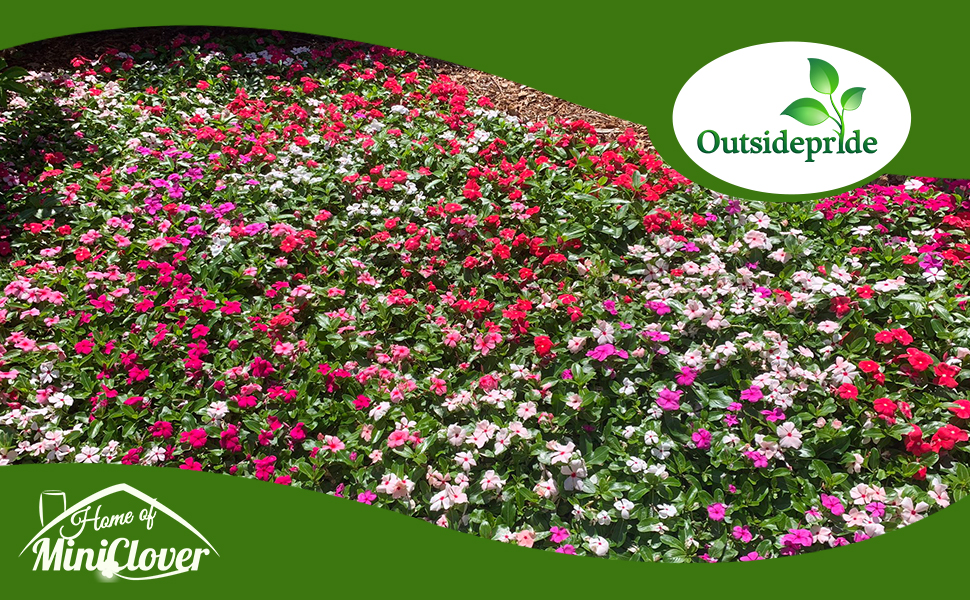
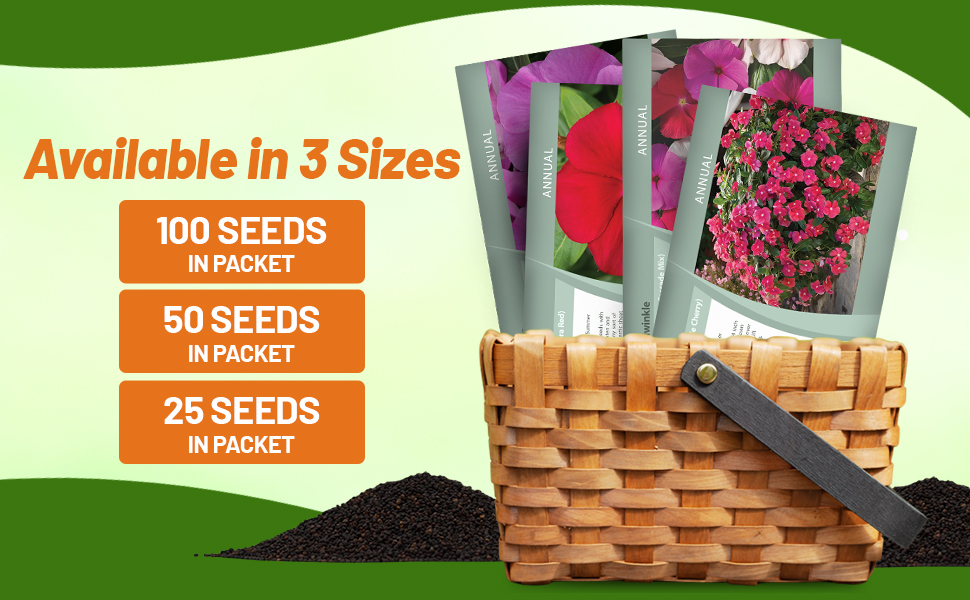
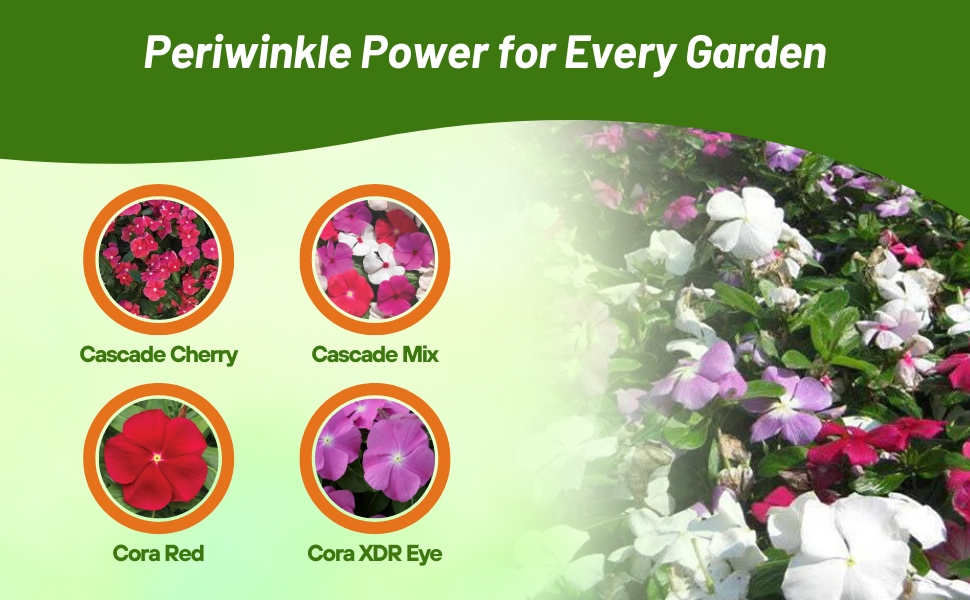
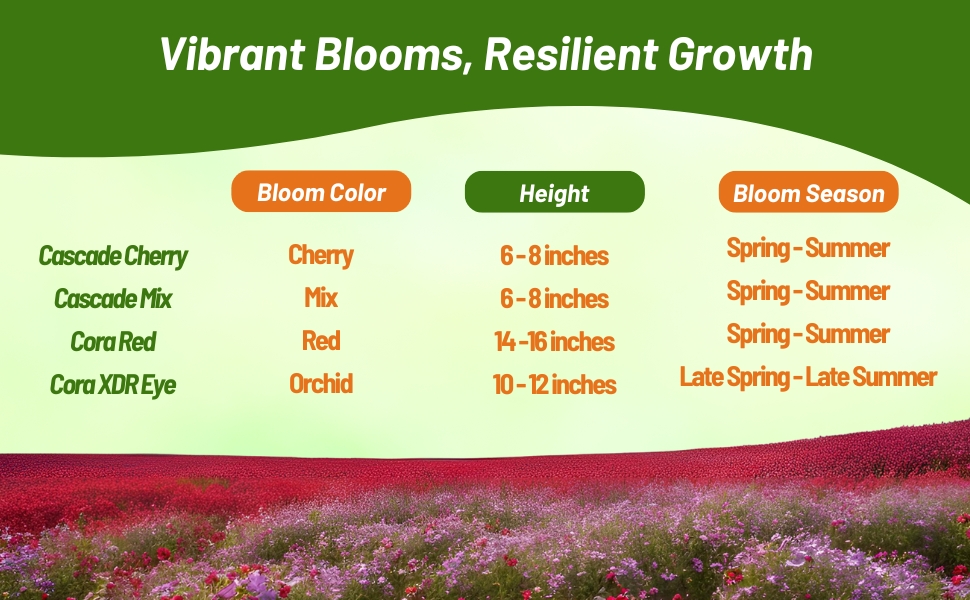
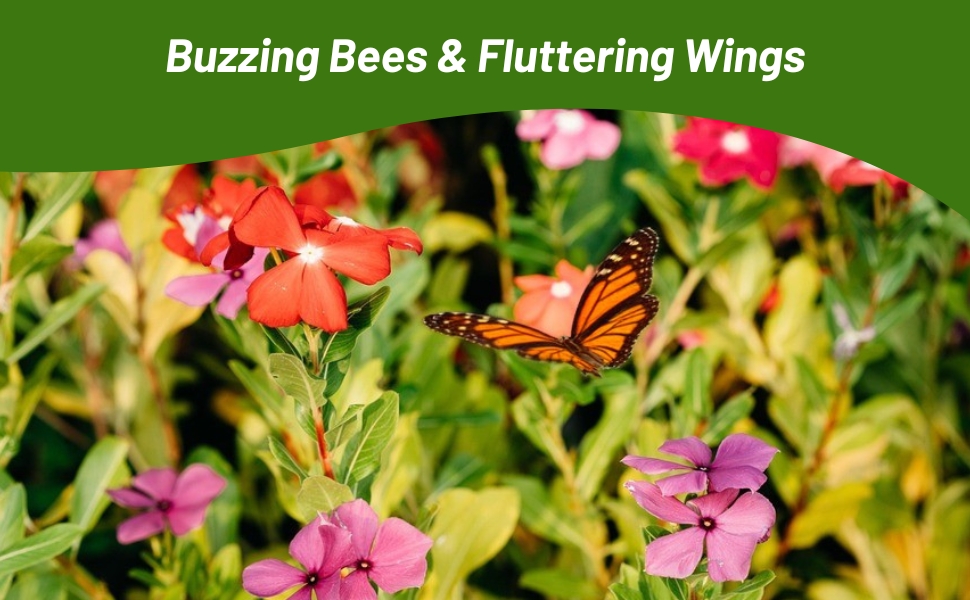
Periwinkle (Catharanthus Roseus Cora Red) - This upright vinca with red flowers reaches 14 - 16 inches in height and spreads 18 - 20 inches making it a large periwinkle plant. Cora has high levels of resistance to multiple strains of pathogens. This vinca has an upright habit making it ideal for summer containers and large landscape borders. Large, high quality red flowers completely cover plants creating blankets of color lasting all season long.
Vinca is best grown in full sun areas or areas that get at least 6 hours of direct sunlight a day. Soil should be well drained and these drought tolerant plants do not need a lot of water so be careful not to overwater. Season long blooms bursting with color from late Spring to late Summer for gardens and containers.
Grow Vinca seeds indoors 4 - 6 weeks before the last frost is expected. Cover the Vinca Periwinkle seeds with 1/4 inch of potting mix, spray with water to moisten and press down lightly. Vinca flower seeds will not germinate in any sort of light, so cover trays or containers with a black plastic sheet or a newspaper. Lift the plastic or newspaper regularly to moisten by misting. Once Periwinkle seedlings emerge, they need bright light. At about 2 - 3 inches tall, transplant the strongest plants into individual pots. The plants can be moved outside once the temperature is consistently above 65F degrees. Directly sowing seeds is not recommended, but if you choose to direct sow, follow the same steps as above. Wait until danger of frost has passed and temperatures are consistently warm, and prepare the soil well so that it is light and fine.
Common Questions
How quickly do annual vincas grow and spread?
Very fast. Annual vinca seedlings will reach full-size by mid-summer.
What plants pair well with annual periwinkle?
Plants that complement annual periwinkle enhance the striking eye of the vinca flower. For instance, consider combining white vincas with a burgundy eye alongside burgundy zinnias, or pairing peach vincas featuring a red eye with bold wine-hued celosia plants. Additionally, other heat and sun-loving plants that work well with vinca include moss rose and penta flowers.
How should you use it in your garden?
Utilize the rapid growth habit of annual vinca to enhance your garden. Purchase a six-pack of vinca plants to fill any empty sunny areas in your garden border where your perennials are still growing. Trailing annual vincas, such as the 'Cora Mix', may not take up much space in the soil, but they will gracefully spill over pathways and emerge from leggy shrubs, bringing a vibrant splash of color to your landscape.
Does vinca get downy mildew like impatiens?
No, many gardeners use it as a substitute for impatiens to brighten shady areas because it is not susceptible to downy mildew.
Can I grow in a container?
Absolutely, they are perfect for containers.
Does vinca attract pollinators?
Yes, they attract bees, butterflies and hummingbirds.
Planting Directions
TEMPERATURE
65 - 70F
AVERAGE GERM TIME
10 - 14 days
LIGHT REQUIRED
No - complete darkness to germinate
DEPTH
1/4 inch
SOWING RATE
2 - 3 seeds per plant or approximately 2,000 seeds covers 50 square feet
MOISTURE
Keep seeds moist until germination
PLANT SPACING
6 - 9 inches
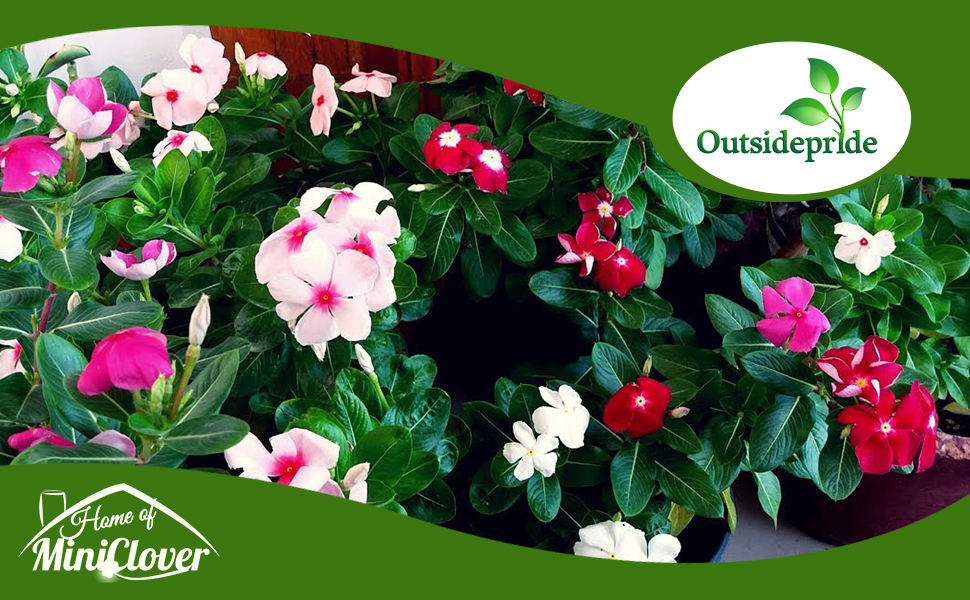
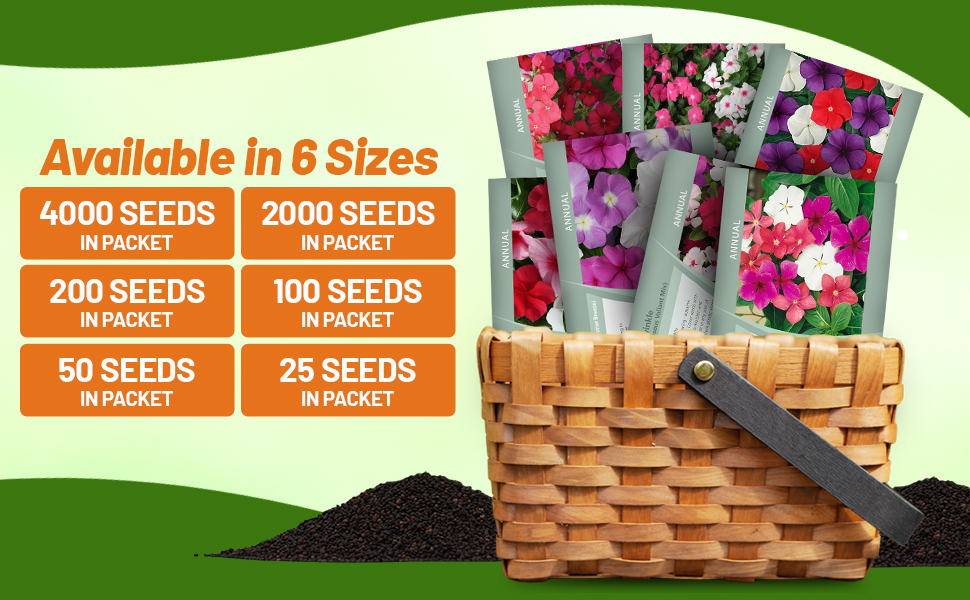
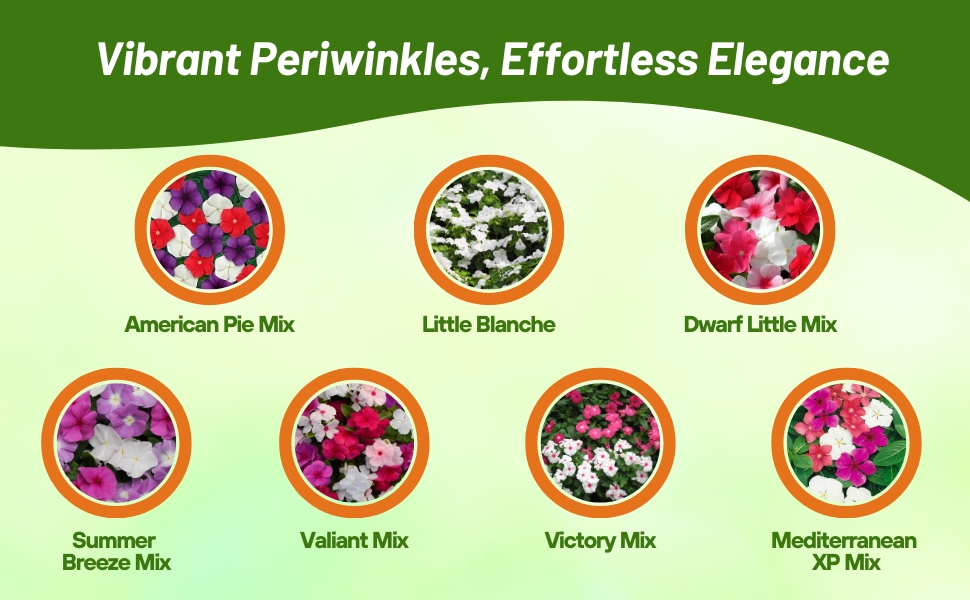
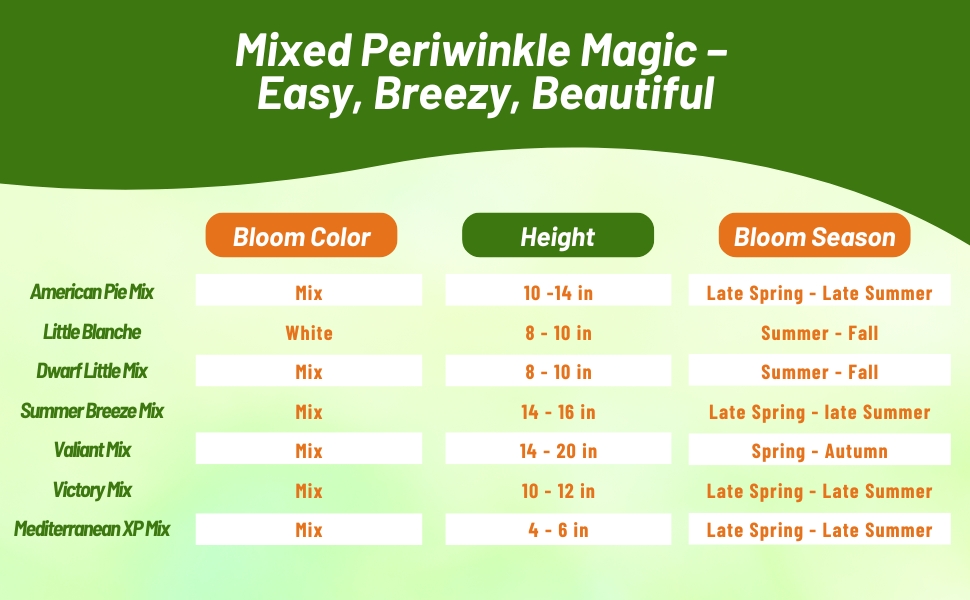
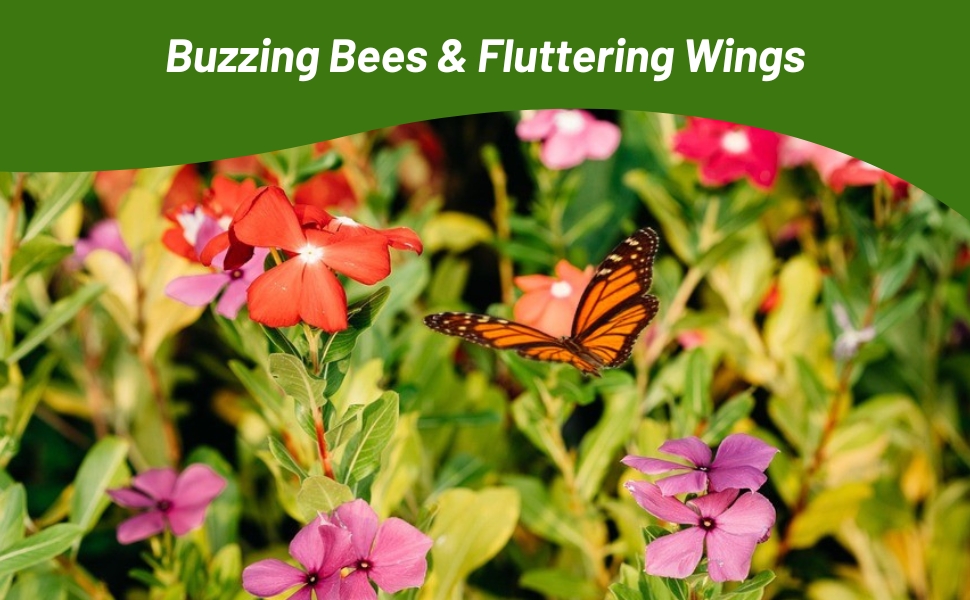
Periwinkle (Vinca Rosea Dwarf Little Mix) - This fabulous performer for the hot summer garden is grown from Periwinkle seeds. For hot southern, desert climates or a hard to maintain spot near a concrete wall or driveway, Vinca Periwinkle is your ground cover plant! It seems to perform the best when other plants are wilting from the heat and it is also resistant to drought.
This annual begins blooming extra-early with big flowers in dazzling colors, and it continues right up until fall frosts. The mix of blooms are 2 inches across and the colors range from white to deep rose with tones in-between. The blooms have a large center eye with a contrasting color and are just gorgeous. The foliage is uniform and neat with shiny leaves. Periwinkle uses include: edging the front of the bed or border, baskets, containers and an excellent ground cover plant.
Grow Vinca Rosea seeds indoors 6 to 10 weeks before the last frost is expected. Cover the flower seeds with 1/4 inch of potting mix, spray with water to moisten and press down lightly. These ground cover seeds will not germinate in any sort of light, so cover trays or containers with a black plastic sheet or a newspaper. Lift the plastic or newspaper regularly to moisten by misting. Once the seedlings emerge, they need bright light. At about 2 - 3 inches tall, transplant the strongest plants into individual pots. The Periwinkle plant can be moved outside once the temperature is consistently above 65F degrees. Directly sowing Vinca seeds is not recommended, but if you choose to direct sow, follow the same steps as above. Wait until danger of frost has passed and temperatures are consistently warm, and prepare the soil well so that it is light and fine.
Common Questions
How quickly do annual vincas grow and spread?
Very fast. Annual vinca seedlings will reach full-size by mid-summer.
What plants pair well with annual periwinkle?
Plants that complement annual periwinkle enhance the striking eye of the vinca flower. For instance, consider combining white vincas with a burgundy eye alongside burgundy zinnias, or pairing peach vincas featuring a red eye with bold wine-hued celosia plants. Additionally, other heat and sun-loving plants that work well with vinca include moss rose and penta flowers.
How should you use it in your garden?
Utilize the rapid growth habit of annual vinca to enhance your garden. Purchase a six-pack of vinca plants to fill any empty sunny areas in your garden border where your perennials are still growing. Trailing annual vincas, such as the 'Cora Mix', may not take up much space in the soil, but they will gracefully spill over pathways and emerge from leggy shrubs, bringing a vibrant splash of color to your landscape.
Does vinca get downy mildew like impatiens?
No, many gardeners use it as a substitute for impatiens to brighten shady areas because it is not susceptible to downy mildew.
Can I grow in a container?
Absolutely, they are perfect for containers.
Does vinca attract pollinators?
Yes, they attract bees, butterflies and hummingbirds.
Planting Directions
TEMPERATURE
65 - 70F
AVERAGE GERM TIME
10 - 14 days
LIGHT REQUIRED
No
DEPTH
1/4 inch
SOIL TYPE
Moist, well-drained, pH 6.1 - 7.8
SOWING RATE
2 - 3 seeds per plant
MOISTURE
Keep seeds moist until germination
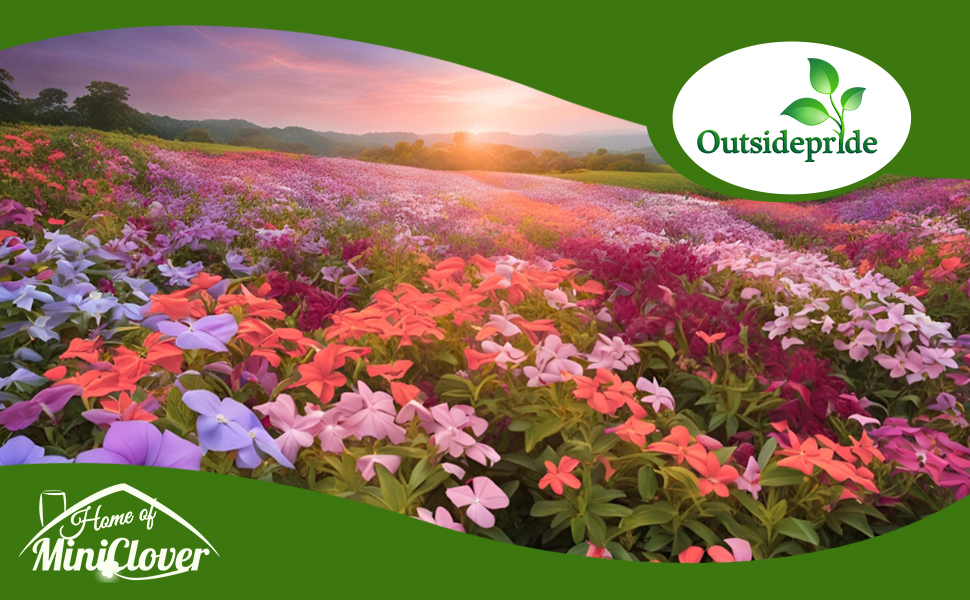
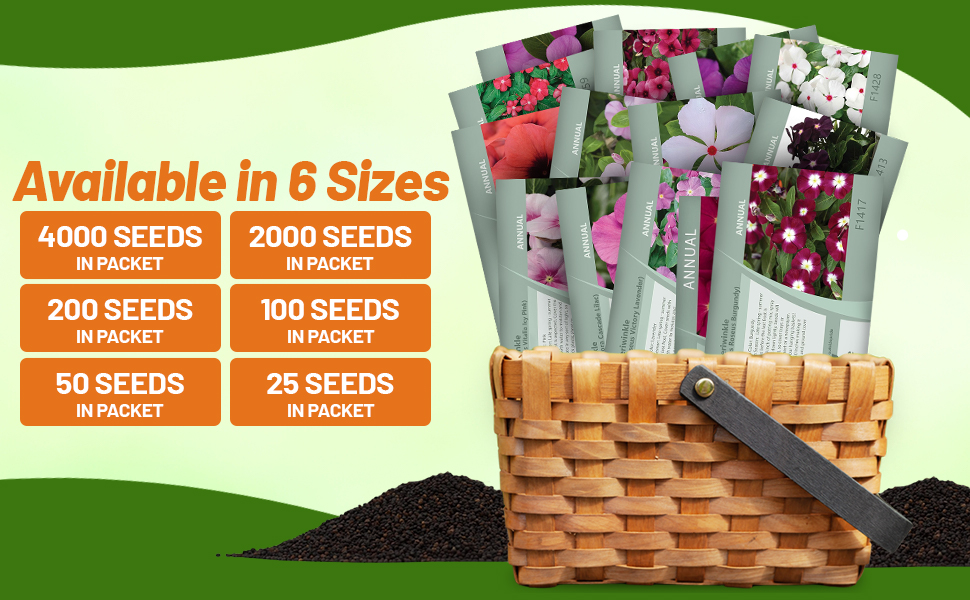
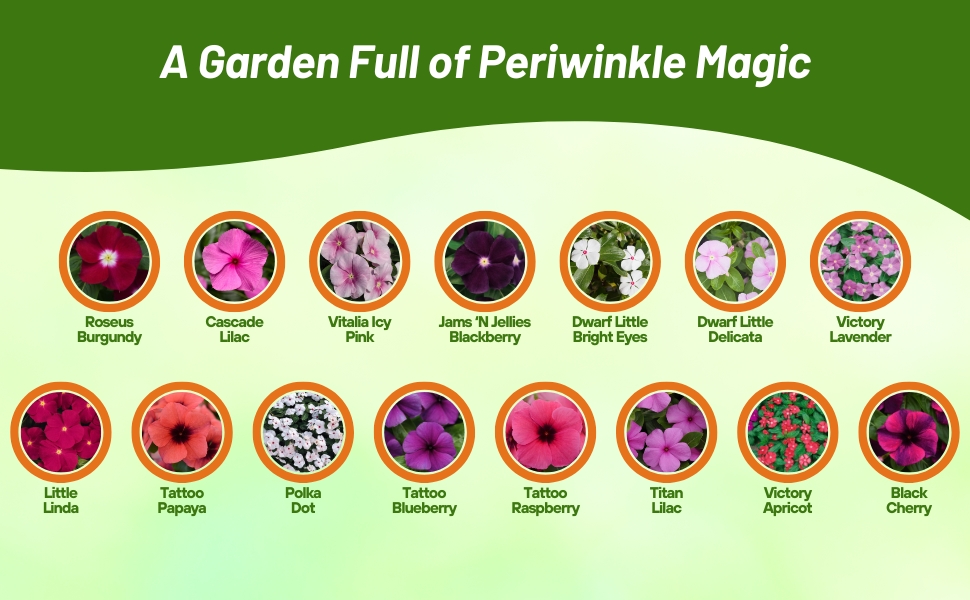
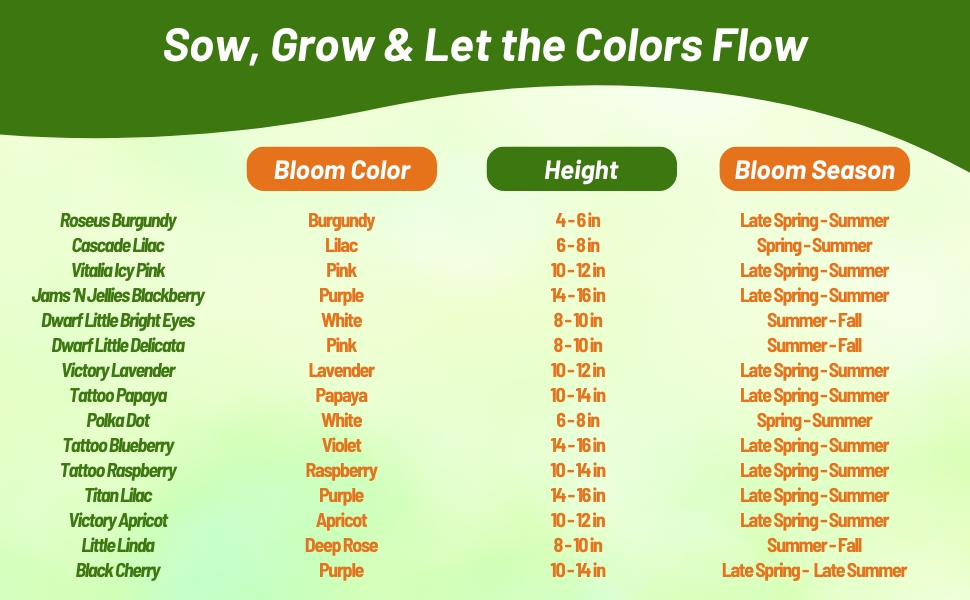
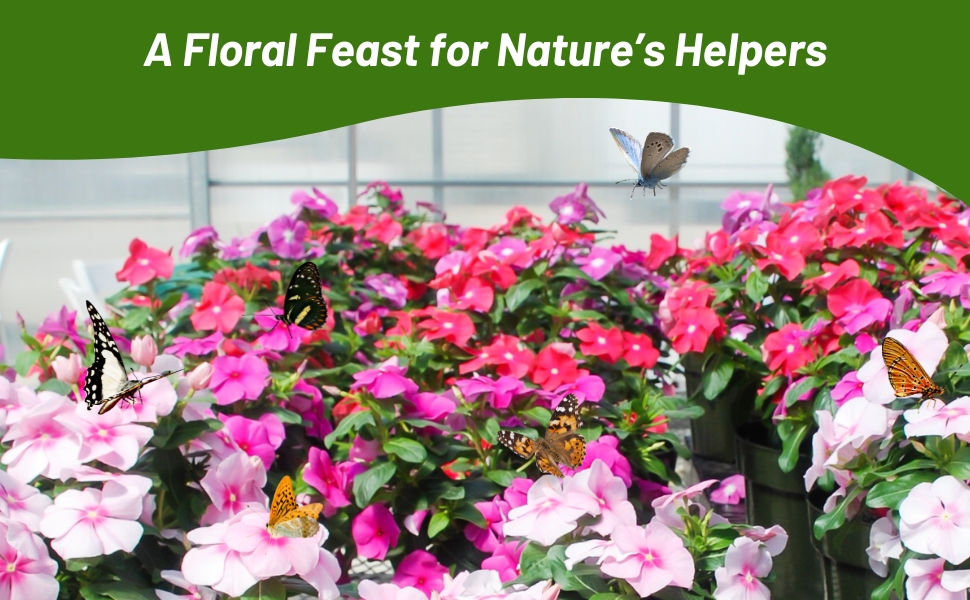
Periwinkle (Catharanthus Roseus Cora Cascade Polka Dot) - This cascading, spreading mix of polka dot flowers will spread 32 - 36 inches in no time and only reaches 6 - 8 inches tall. There is no other periwinkle like this cascading cora. Cora has high levels of resistance to multiple strains of pathogens. This vinca has a mounded and spreading habit making it ideal for summer baskets, mixed containers, and large landscape beds where a ground cover is desired. Large, high quality polka dot flowers completely cover plants creating blankets of color lasting all season long.
Vinca is best grown in full sun areas or areas that get at least 6 hours of direct sunlight a day. Soil should be well drained and these drought tolerant plants do not need a lot of water so be careful not to overwater. Season long blooms bursting with color from late Spring to late Summer for gardens and containers.
Grow Vinca seeds indoors 4 - 6 weeks before the last frost is expected. Cover the Vinca Periwinkle seeds with 1/4 inch of potting mix, spray with water to moisten and press down lightly. Vinca flower seeds will not germinate in any sort of light, so cover trays or containers with a black plastic sheet or a newspaper. Lift the plastic or newspaper regularly to moisten by misting. Once Periwinkle seedlings emerge, they need bright light. At about 2 - 3 inches tall, transplant the strongest plants into individual pots. The plants can be moved outside once the temperature is consistently above 65F degrees. Directly sowing seeds is not recommended, but if you choose to direct sow, follow the same steps as above. Wait until danger of frost has passed and temperatures are consistently warm, and prepare the soil well so that it is light and fine.
Common Questions
How quickly do annual vincas grow and spread?
Very fast. Annual vinca seedlings will reach full-size by mid-summer.
What plants pair well with annual periwinkle?
Plants that complement annual periwinkle enhance the striking eye of the vinca flower. For instance, consider combining white vincas with a burgundy eye alongside burgundy zinnias, or pairing peach vincas featuring a red eye with bold wine-hued celosia plants. Additionally, other heat and sun-loving plants that work well with vinca include moss rose and penta flowers.
How should you use it in your garden?
Utilize the rapid growth habit of annual vinca to enhance your garden. Purchase a six-pack of vinca plants to fill any empty sunny areas in your garden border where your perennials are still growing. Trailing annual vincas, such as the 'Cora Mix', may not take up much space in the soil, but they will gracefully spill over pathways and emerge from leggy shrubs, bringing a vibrant splash of color to your landscape.
Does vinca get downy mildew like impatiens?
No, many gardeners use it as a substitute for impatiens to brighten shady areas because it is not susceptible to downy mildew.
Can I grow in a container?
Absolutely, they are perfect for containers.
Does vinca attract pollinators?
Yes, they attract bees, butterflies and hummingbirds.
Planting Directions
TEMPERATURE
65 - 70F
AVERAGE GERM TIME
10 - 14 days
LIGHT REQUIRED
No
DEPTH
1/4 inch
SOIL TYPE
Moist, well-drained, pH 6.1 - 7.8
SOWING RATE
2 - 3 seeds per plant
MOISTURE
Keep seeds moist until germination
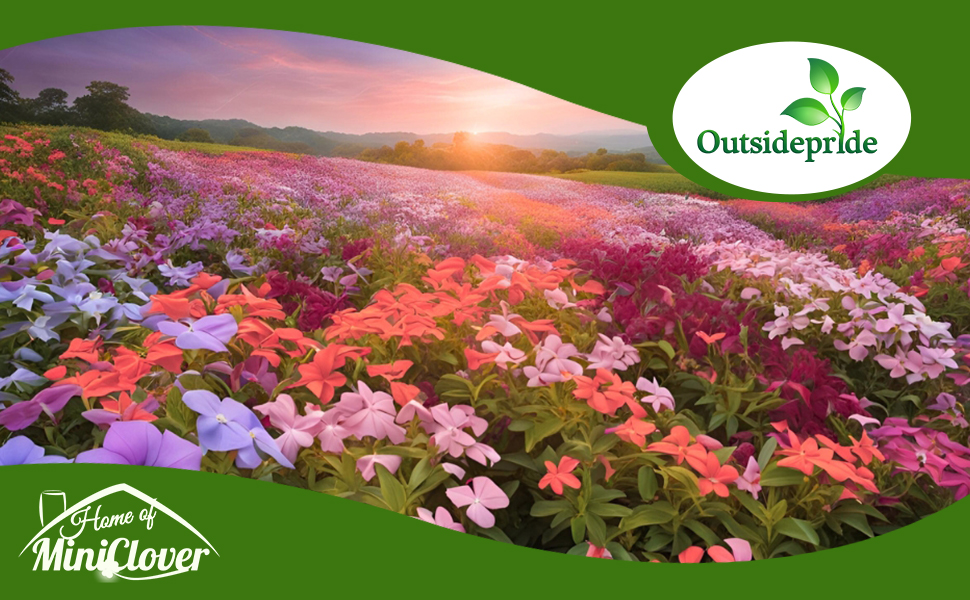
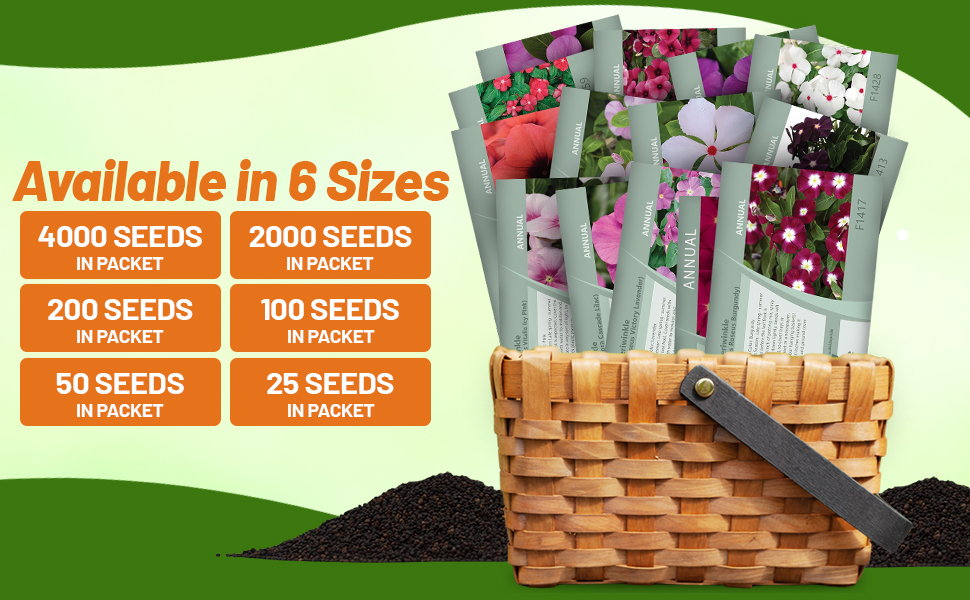
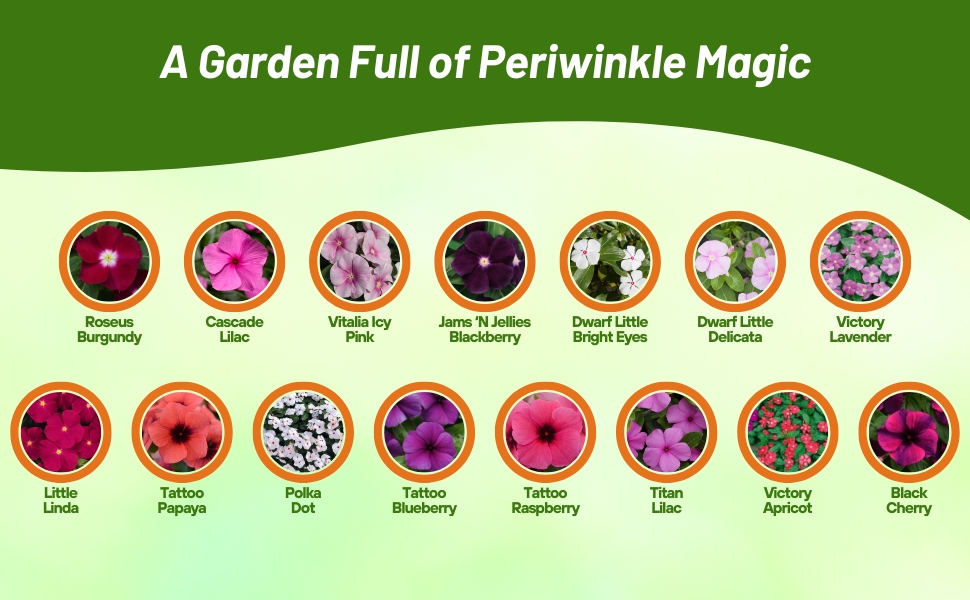
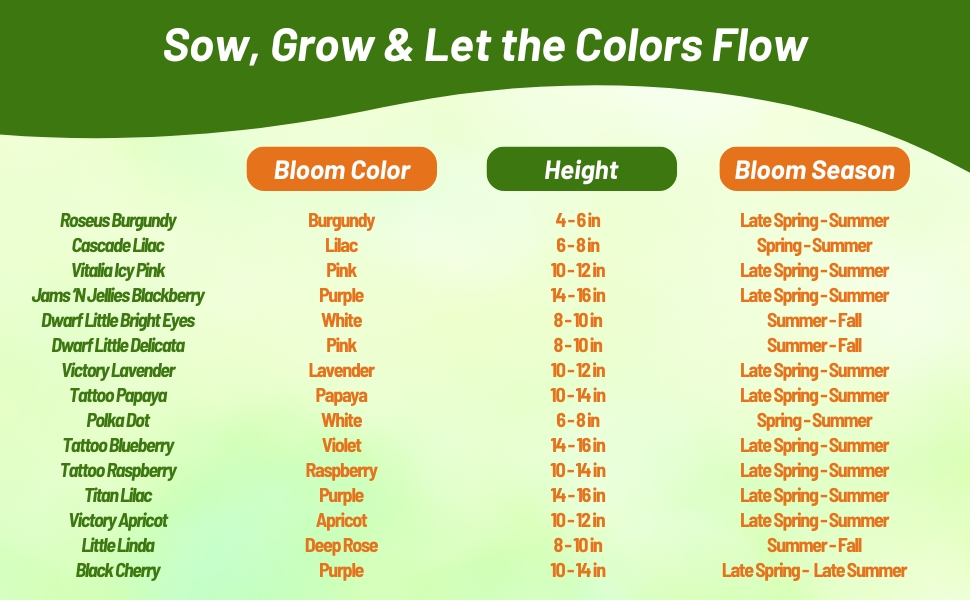
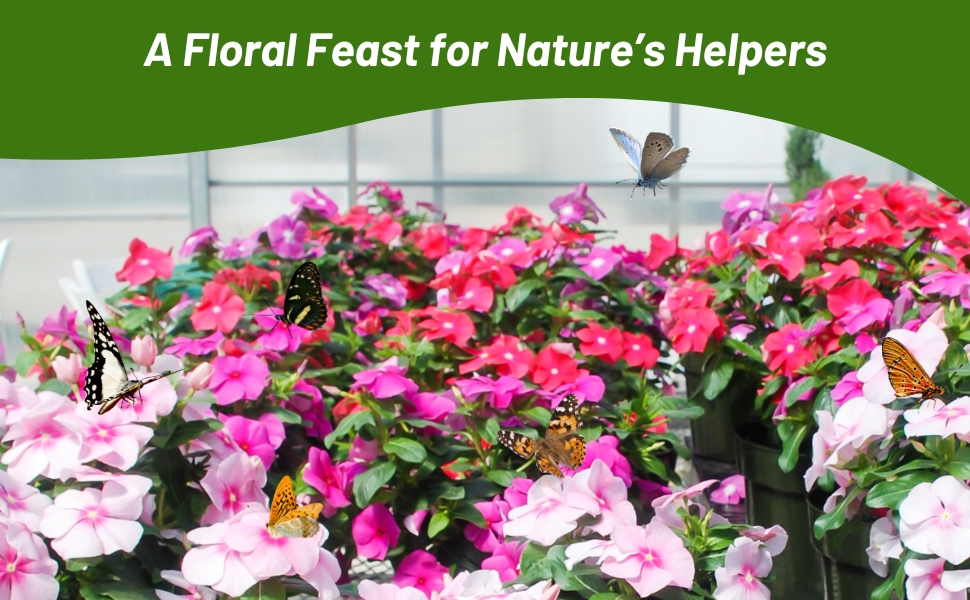
Periwinkle (Catharanthus Roseus Victory Lavender) - Large, brightly colored lavender blooms cover these highly disease resistant plants. The strong root system helps the plants to survive hot and humid summers. Join this periwinkle plant with other heat loving bedding plants in the garden on in the container. This line of vinca has an upright and uniform growth habit.
Vinca is best grown in full sun areas or areas that get at least 6 hours of direct sunlight a day. Soil should be well drained and these drought tolerant plants do not need a lot of water so be careful not to overwater. Season long blooms bursting with color from late Spring to late Summer for xeriscape gardens and containers.
Grow Vinca seeds indoors 4 - 6 weeks before the last frost is expected. Cover the Vinca Periwinkle seeds with 1/4 inch of potting mix, spray with water to moisten and press down lightly. Vinca flower seeds will not germinate in any sort of light, so cover trays or containers with a black plastic sheet or a newspaper. Lift the plastic or newspaper regularly to moisten by misting. Once Periwinkle seedlings emerge, they need bright light. At about 2 - 3 inches tall, transplant the strongest plants into individual pots. The plants can be moved outside once the temperature is consistently above 65F degrees. Directly sowing seeds is not recommended, but if you choose to direct sow, follow the same steps as above. Wait until danger of frost has passed and temperatures are consistently warm, and prepare the soil well so that it is light and fine.
Common Questions
How quickly do annual vincas grow and spread?
Very fast. Annual vinca seedlings will reach full-size by mid-summer.
What plants pair well with annual periwinkle?
Plants that complement annual periwinkle enhance the striking eye of the vinca flower. For instance, consider combining white vincas with a burgundy eye alongside burgundy zinnias, or pairing peach vincas featuring a red eye with bold wine-hued celosia plants. Additionally, other heat and sun-loving plants that work well with vinca include moss rose and penta flowers.
How should you use it in your garden?
Utilize the rapid growth habit of annual vinca to enhance your garden. Purchase a six-pack of vinca plants to fill any empty sunny areas in your garden border where your perennials are still growing. Trailing annual vincas, such as the 'Cora Mix', may not take up much space in the soil, but they will gracefully spill over pathways and emerge from leggy shrubs, bringing a vibrant splash of color to your landscape.
Does vinca get downy mildew like impatiens?
No, many gardeners use it as a substitute for impatiens to brighten shady areas because it is not susceptible to downy mildew.
Can I grow in a container?
Absolutely, they are perfect for containers.
Does vinca attract pollinators?
Yes, they attract bees, butterflies and hummingbirds.
Planting Directions
TEMPERATURE
65 - 70F
AVERAGE GERM TIME
10 - 14 days
LIGHT REQUIRED
No
DEPTH
1/4 inch
SOIL TYPE
Moist, well-drained, pH 6.1 - 7.8
SOWING RATE
2 - 3 seeds per plant
MOISTURE
Keep seeds moist until germination
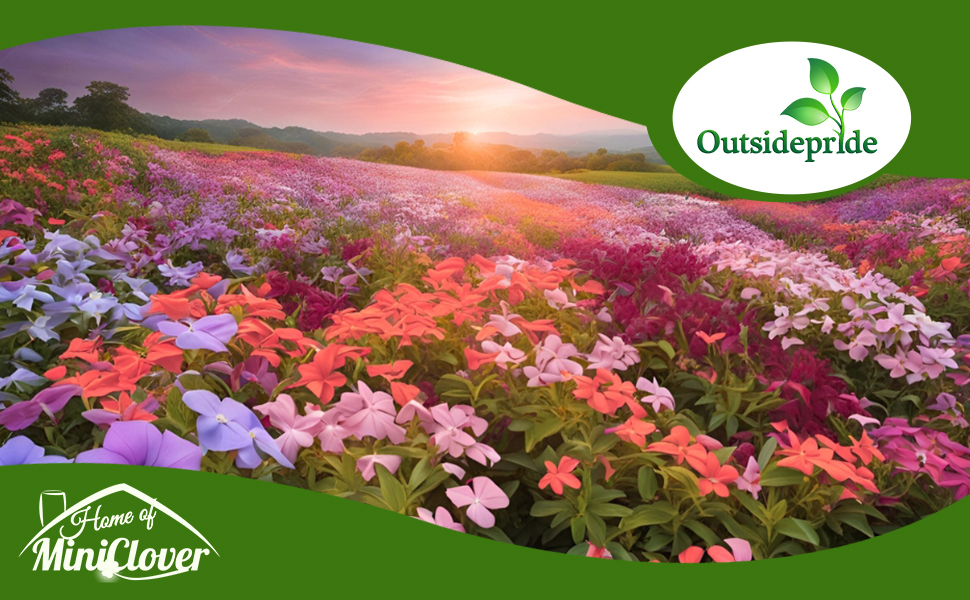
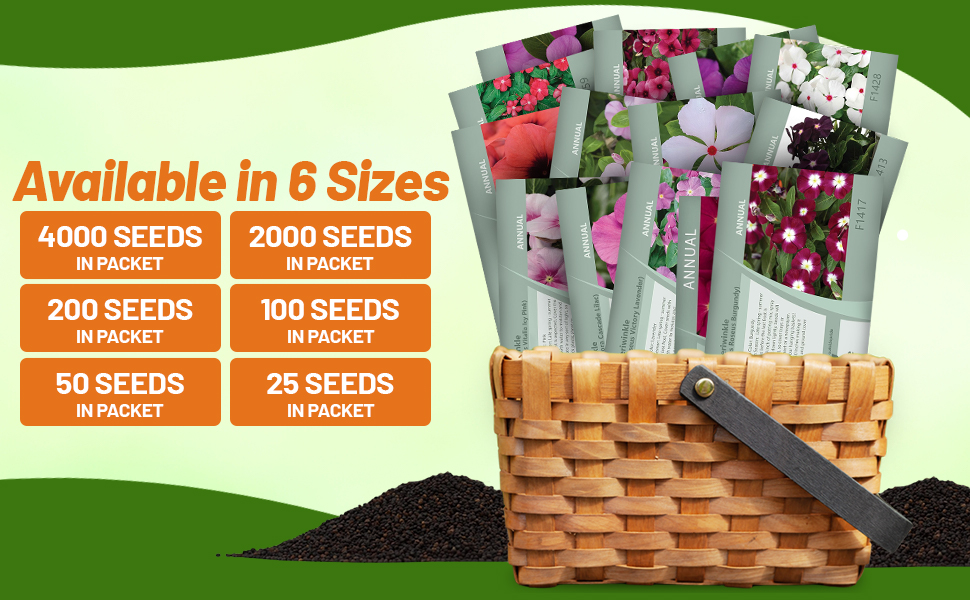
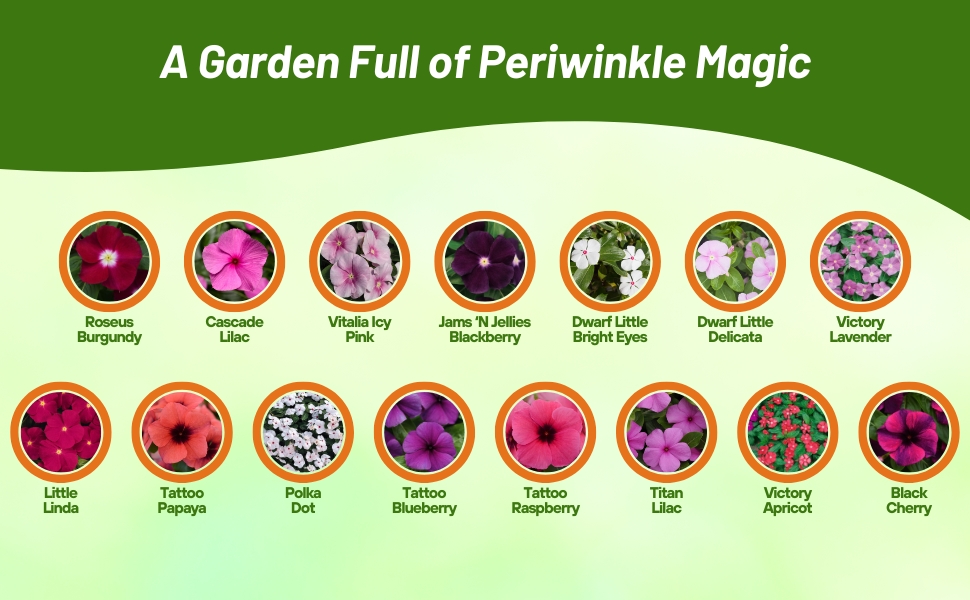
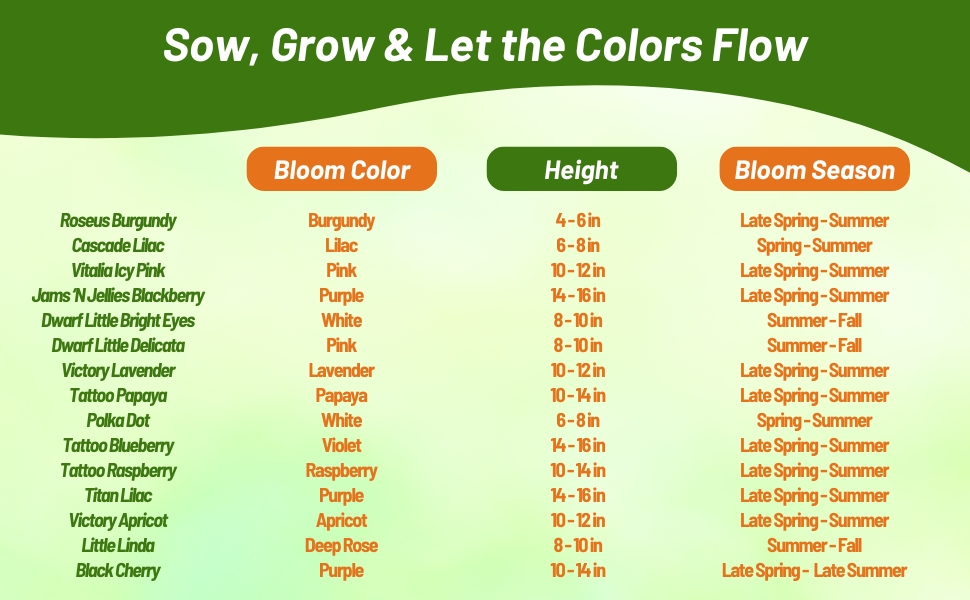
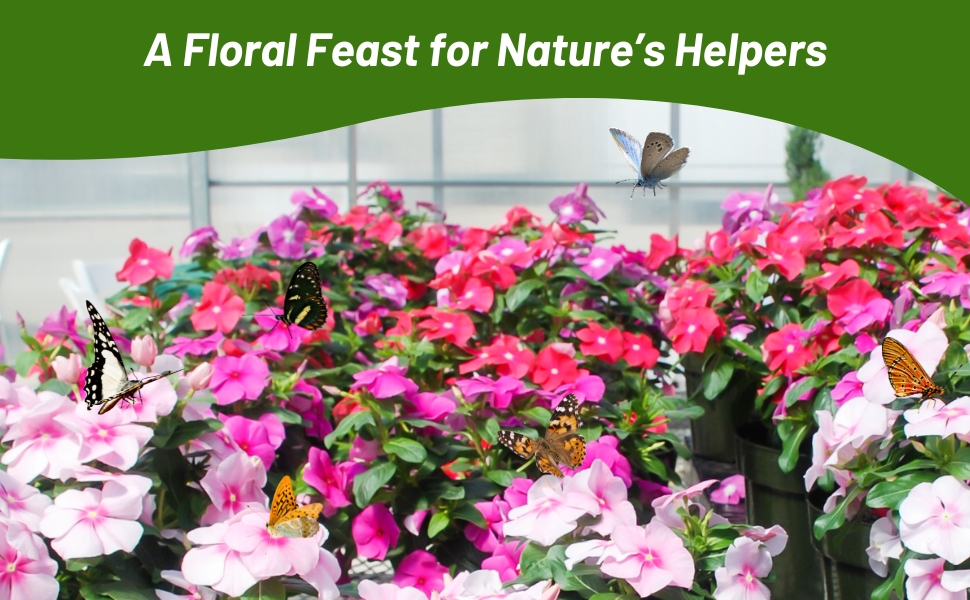
Periwinkle (Catharanthus Roseus Victory Apricot) - Large, brightly colored apricot blooms cover these highly disease resistant plants. The strong root system helps the plants to survive hot and humid summers. Join this periwinkle plant with other heat loving bedding plants in the garden on in the container. This line of vinca has an upright and uniform growth habit.
Vinca is best grown in full sun areas or areas that get at least 6 hours of direct sunlight a day. Soil should be well drained and these drought tolerant plants do not need a lot of water so be careful not to overwater. Season long blooms bursting with color from late Spring to late Summer for gardens and containers.
Grow Vinca seeds indoors 4 - 6 weeks before the last frost is expected. Cover the Vinca Periwinkle seeds with 1/4 inch of potting mix, spray with water to moisten and press down lightly. Vinca flower seeds will not germinate in any sort of light, so cover trays or containers with a black plastic sheet or a newspaper. Lift the plastic or newspaper regularly to moisten by misting. Once Periwinkle seedlings emerge, they need bright light. At about 2 - 3 inches tall, transplant the strongest plants into individual pots. The plants can be moved outside once the temperature is consistently above 65F degrees. Directly sowing seeds is not recommended, but if you choose to direct sow, follow the same steps as above. Wait until danger of frost has passed and temperatures are consistently warm, and prepare the soil well so that it is light and fine.
Common Questions
How quickly do annual vincas grow and spread?
Very fast. Annual vinca seedlings will reach full-size by mid-summer.
What plants pair well with annual periwinkle?
Plants that complement annual periwinkle enhance the striking eye of the vinca flower. For instance, consider combining white vincas with a burgundy eye alongside burgundy zinnias, or pairing peach vincas featuring a red eye with bold wine-hued celosia plants. Additionally, other heat and sun-loving plants that work well with vinca include moss rose and penta flowers.
How should you use it in your garden?
Utilize the rapid growth habit of annual vinca to enhance your garden. Purchase a six-pack of vinca plants to fill any empty sunny areas in your garden border where your perennials are still growing. Trailing annual vincas, such as the 'Cora Mix', may not take up much space in the soil, but they will gracefully spill over pathways and emerge from leggy shrubs, bringing a vibrant splash of color to your landscape.
Does vinca get downy mildew like impatiens?
No, many gardeners use it as a substitute for impatiens to brighten shady areas because it is not susceptible to downy mildew.
Can I grow in a container?
Absolutely, they are perfect for containers.
Does vinca attract pollinators?
Yes, they attract bees, butterflies and hummingbirds.
Planting Directions
TEMPERATURE
65 - 70F
AVERAGE GERM TIME
10 - 14 days
LIGHT REQUIRED
No
DEPTH
1/4 inch
SOIL TYPE
Moist, well-drained, pH 6.1 - 7.8
SOWING RATE
2 - 3 seeds per plant
MOISTURE
Keep seeds moist until germination
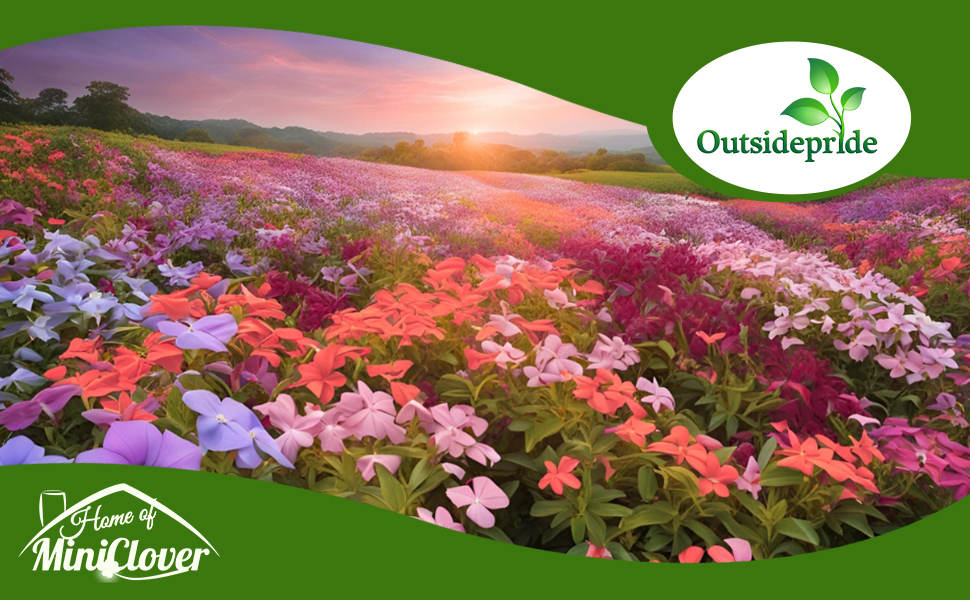
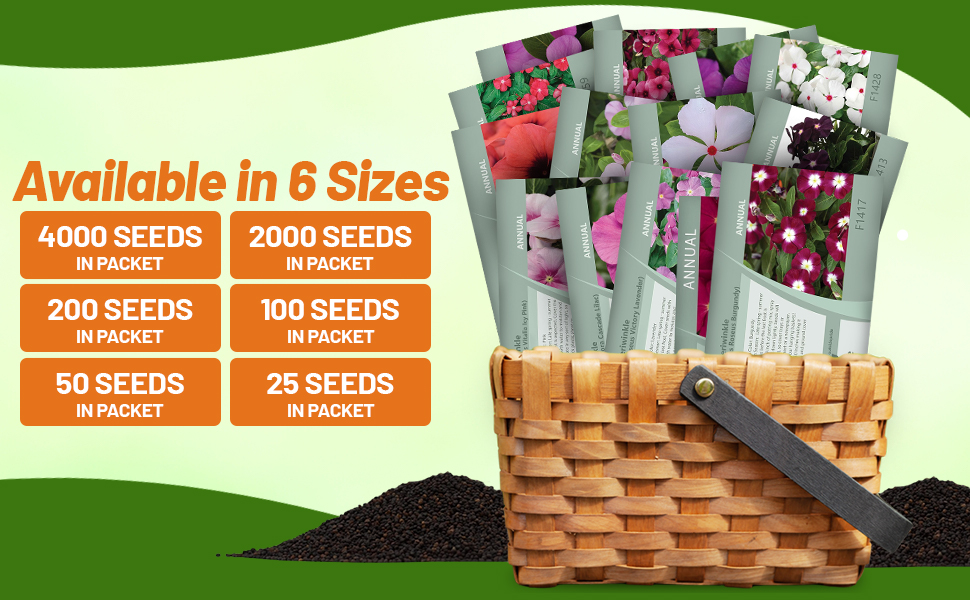
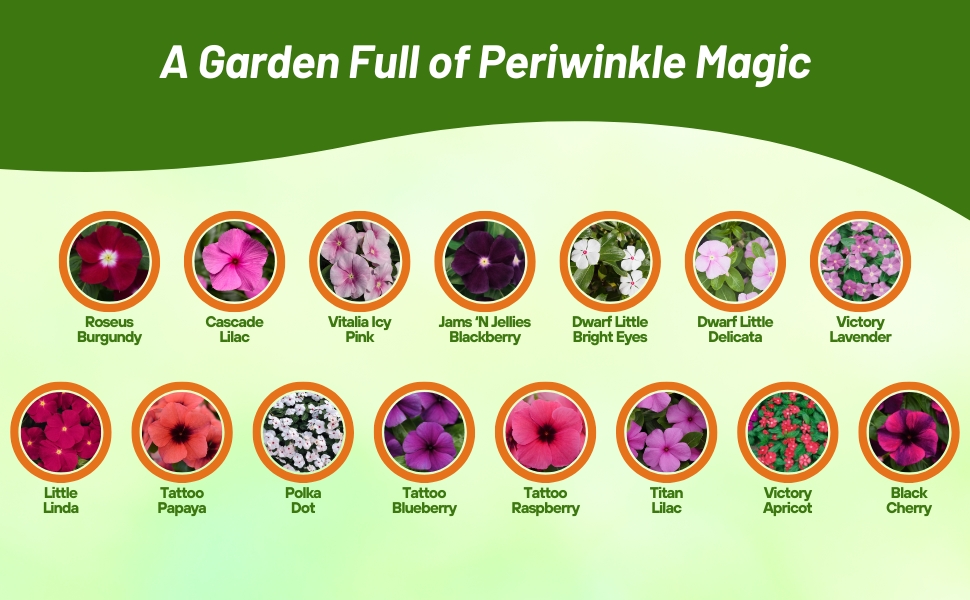
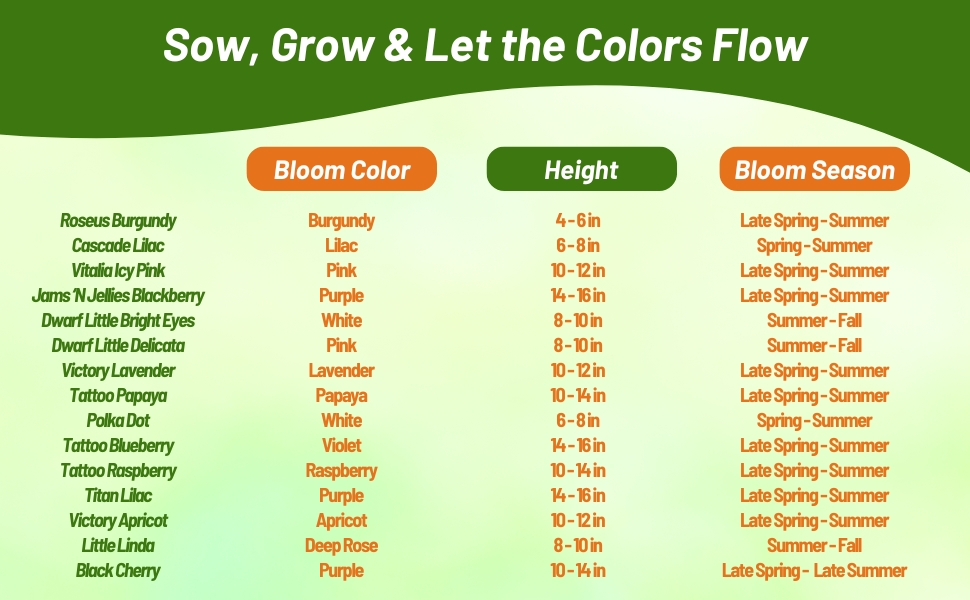
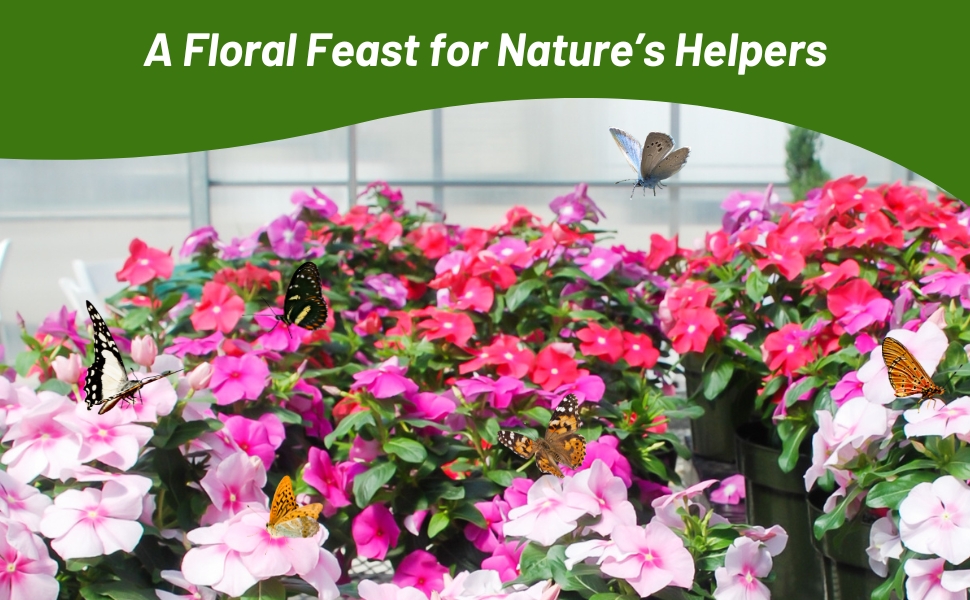
Periwinkle (Catharanthus Roseus Vitalia Icy Pink) - Sporting a full line-up of bright colors and a tidy, mounded habit, our Vitalia series uniformly blooms earlier. Fun colors like Icy Pink is sure to please even the most selective gardener. The entire series performs exceptionally well in hot and dry garden conditions. Vitalia is easy to care for and easy to love.
Vinca is best grown in full sun areas or areas that get at least 6 hours of direct sunlight a day. Soil should be well drained and these drought tolerant plants do not need a lot of water so be careful not to overwater. Season long blooms bursting with color from late Spring to late Summer for gardens and containers.
Grow Vinca seeds indoors 4 - 6 weeks before the last frost is expected. Cover the Vinca Periwinkle seeds with 1/4 inch of potting mix, spray with water to moisten and press down lightly. Vinca flower seeds will not germinate in any sort of light, so cover trays or containers with a black plastic sheet or a newspaper. Lift the plastic or newspaper regularly to moisten by misting. Once Periwinkle seedlings emerge, they need bright light. At about 2 - 3 inches tall, transplant the strongest plants into individual pots. The plants can be moved outside once the temperature is consistently above 65F degrees. Directly sowing seeds is not recommended, but if you choose to direct sow, follow the same steps as above. Wait until danger of frost has passed and temperatures are consistently warm, and prepare the soil well so that it is light and fine.
Common Questions
How quickly do annual vincas grow and spread?
Very fast. Annual vinca seedlings will reach full-size by mid-summer.
What plants pair well with annual periwinkle?
Plants that complement annual periwinkle enhance the striking eye of the vinca flower. For instance, consider combining white vincas with a burgundy eye alongside burgundy zinnias, or pairing peach vincas featuring a red eye with bold wine-hued celosia plants. Additionally, other heat and sun-loving plants that work well with vinca include moss rose and penta flowers.
How should you use it in your garden?
Utilize the rapid growth habit of annual vinca to enhance your garden. Purchase a six-pack of vinca plants to fill any empty sunny areas in your garden border where your perennials are still growing. Trailing annual vincas, such as the 'Cora Mix', may not take up much space in the soil, but they will gracefully spill over pathways and emerge from leggy shrubs, bringing a vibrant splash of color to your landscape.
Does vinca get downy mildew like impatiens?
No, many gardeners use it as a substitute for impatiens to brighten shady areas because it is not susceptible to downy mildew.
Can I grow in a container?
Absolutely, they are perfect for containers.
Does vinca attract pollinators?
Yes, they attract bees, butterflies and hummingbirds.
Planting Directions
TEMPERATURE
65 - 70F
AVERAGE GERM TIME
10 - 14 days
LIGHT REQUIRED
No
DEPTH
1/4 inch
SOIL TYPE
Moist, well-drained, pH 6.1 - 7.8
SOWING RATE
2 - 3 seeds per plant
MOISTURE
Keep seeds moist until germination
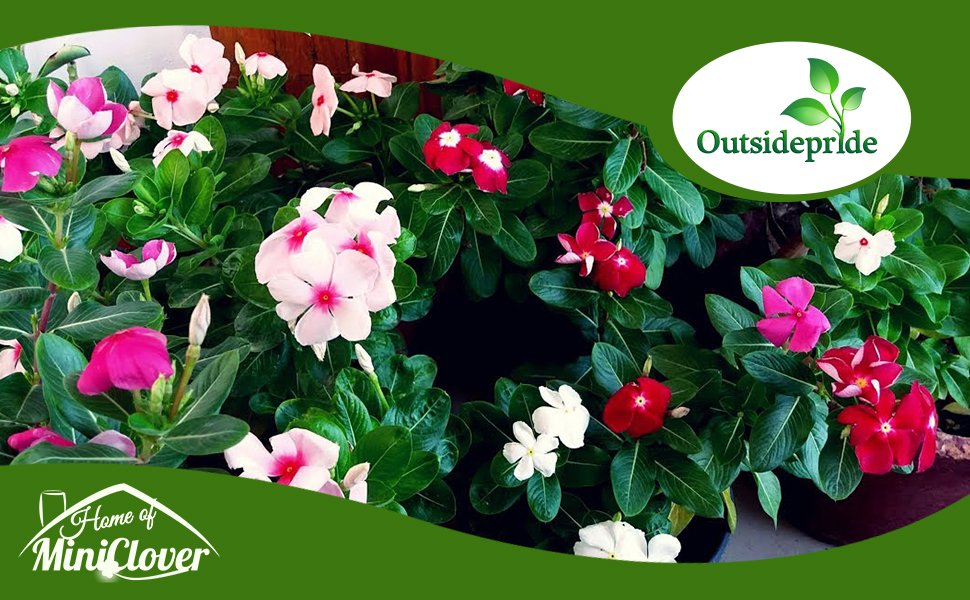
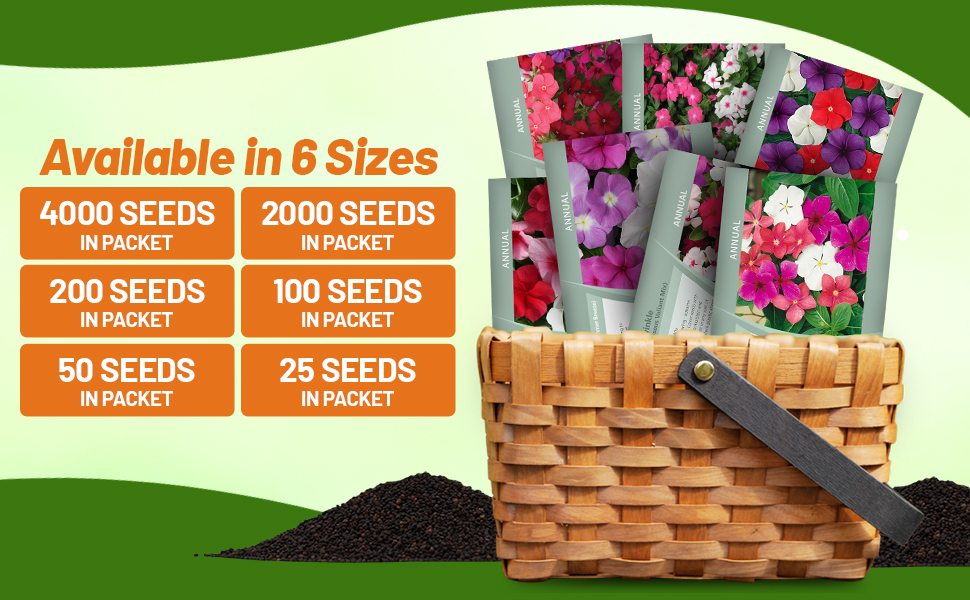
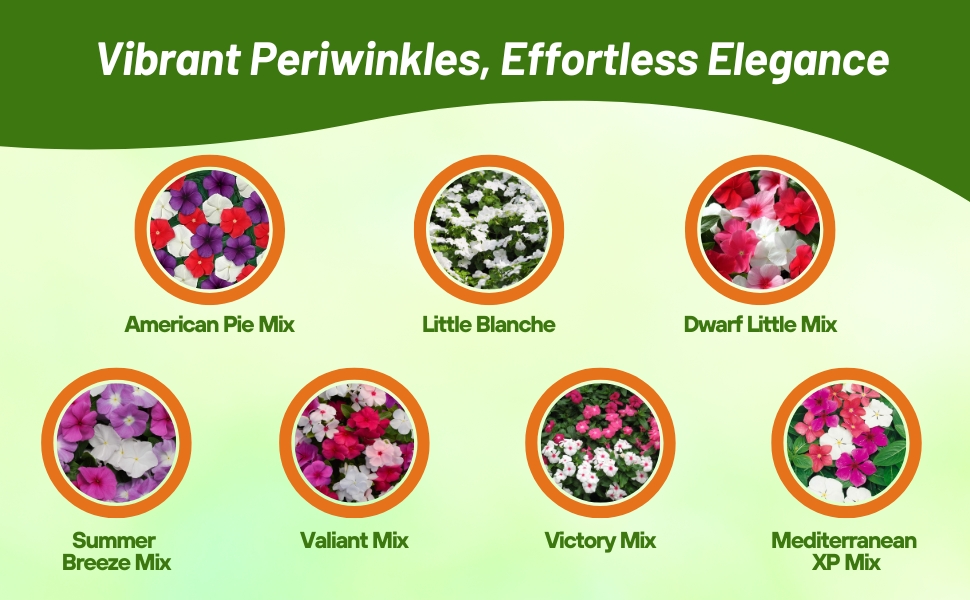
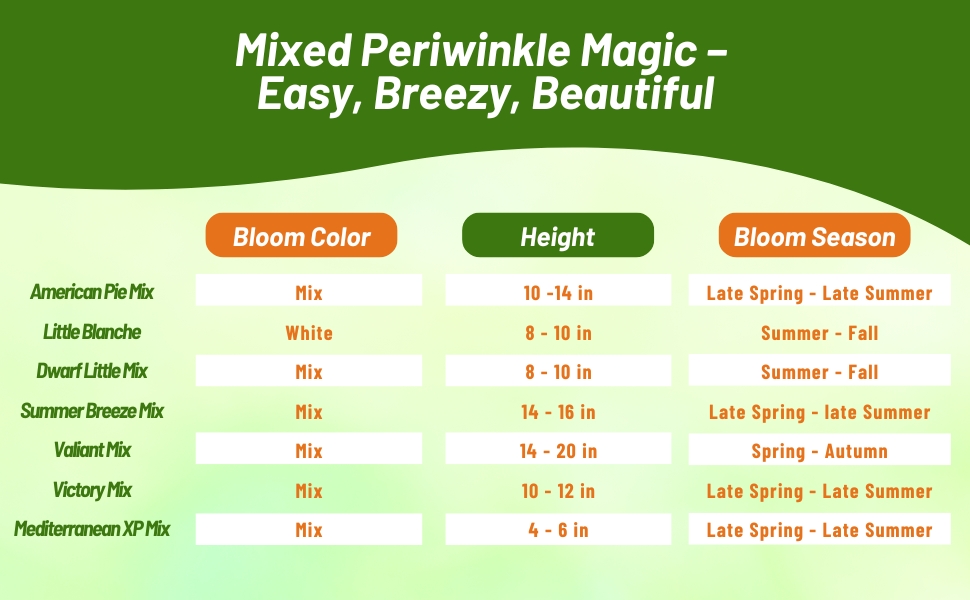
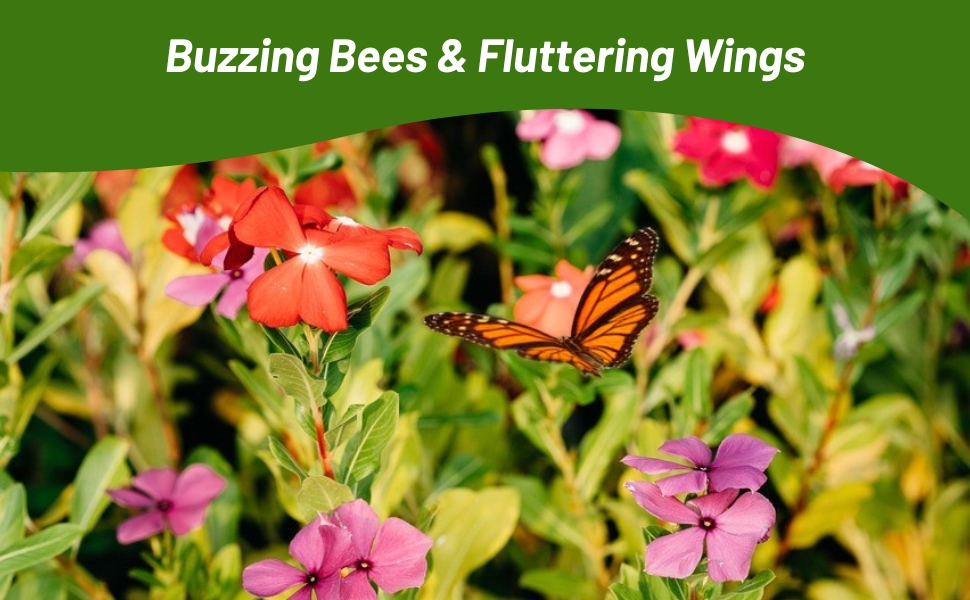
Periwinkle (Catharanthus Roseus Valiant Mix) - The Valiant periwinkle series is more vigorous than its competitors and has superior disease resistance. Makes well-branched vinca plants with large flowers that show off high impact colors of apricot, burgundy, lilac, punch, and white. Performs very well under stresses such as sun, heat, drought, salt, and cool/damp conditions. Very low maintenance plant with good landscape longevity.
Vinca is best grown in full sun areas or areas that get at least 6 hours of direct sunlight a day. Soil should be well drained and these drought tolerant plants do not need a lot of water so be careful not to overwater. Season long blooms bursting with color from late Spring to late Summer for gardens and containers.
Grow Vinca seeds indoors 4 - 6 weeks before the last frost is expected. Cover the Vinca Periwinkle seeds with 1/4 inch of potting mix, spray with water to moisten and press down lightly. Vinca flower seeds will not germinate in any sort of light, so cover trays or containers with a black plastic sheet or a newspaper. Lift the plastic or newspaper regularly to moisten by misting. Once Periwinkle seedlings emerge, they need bright light. At about 2 - 3 inches tall, transplant the strongest plants into individual pots. The plants can be moved outside once the temperature is consistently above 65F degrees. Directly sowing seeds is not recommended, but if you choose to direct sow, follow the same steps as above. Wait until danger of frost has passed and temperatures are consistently warm, and prepare the soil well so that it is light and fine.
Common Questions
How quickly do annual vincas grow and spread?
Very fast. Annual vinca seedlings will reach full-size by mid-summer.
What plants pair well with annual periwinkle?
Plants that complement annual periwinkle enhance the striking eye of the vinca flower. For instance, consider combining white vincas with a burgundy eye alongside burgundy zinnias, or pairing peach vincas featuring a red eye with bold wine-hued celosia plants. Additionally, other heat and sun-loving plants that work well with vinca include moss rose and penta flowers.
How should you use it in your garden?
Utilize the rapid growth habit of annual vinca to enhance your garden. Purchase a six-pack of vinca plants to fill any empty sunny areas in your garden border where your perennials are still growing. Trailing annual vincas, such as the 'Cora Mix', may not take up much space in the soil, but they will gracefully spill over pathways and emerge from leggy shrubs, bringing a vibrant splash of color to your landscape.
Does vinca get downy mildew like impatiens?
No, many gardeners use it as a substitute for impatiens to brighten shady areas because it is not susceptible to downy mildew.
Can I grow in a container?
Absolutely, they are perfect for containers.
Does vinca attract pollinators?
Yes, they attract bees, butterflies and hummingbirds.
Planting Directions
TEMPERATURE
65 - 70F
AVERAGE GERM TIME
10 - 14 days
LIGHT REQUIRED
No
DEPTH
1/4 inch
SOIL TYPE
Moist, well-drained, pH 6.1 - 7.8
SOWING RATE
2 - 3 seeds per plant
MOISTURE
Keep seeds moist until germination
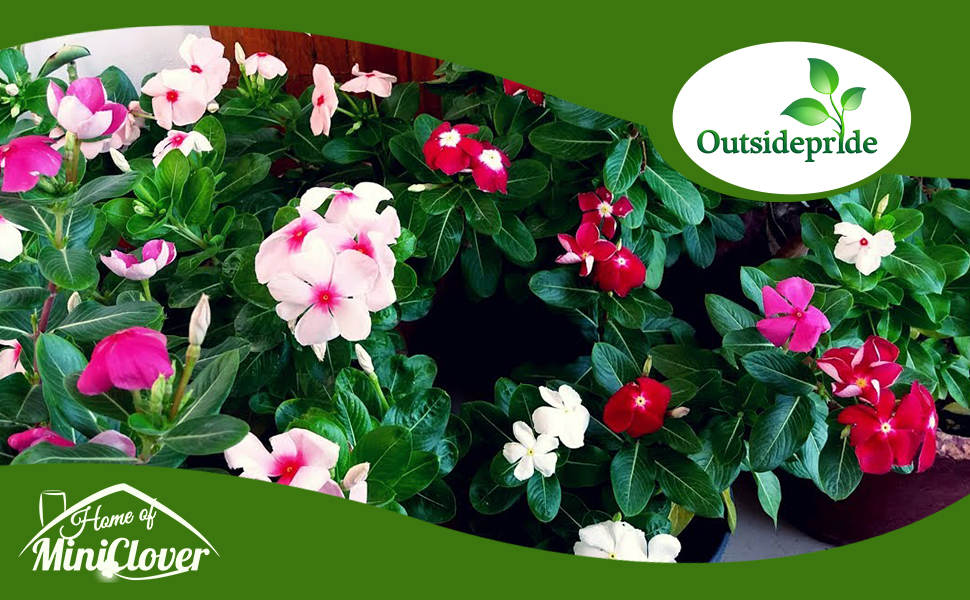
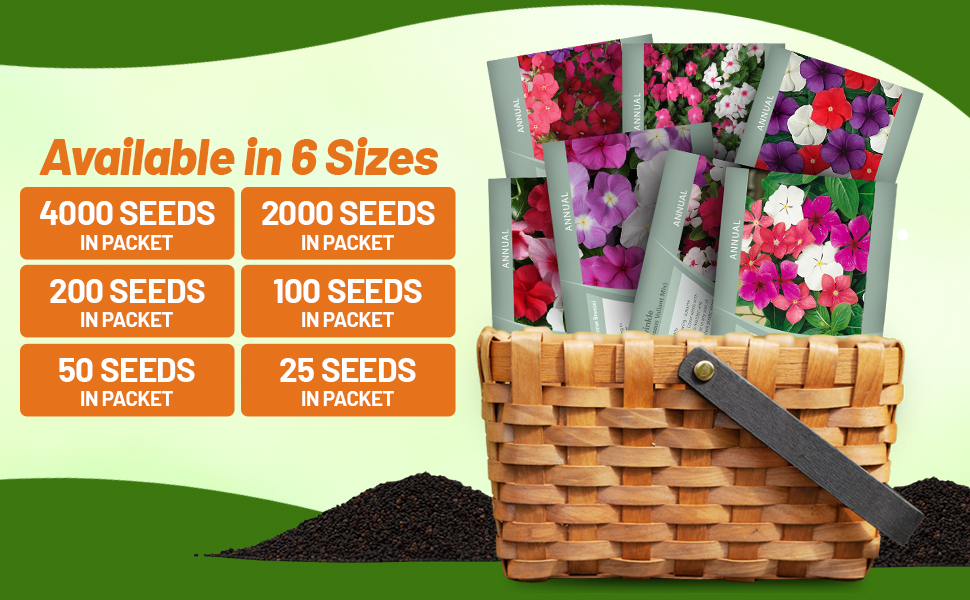

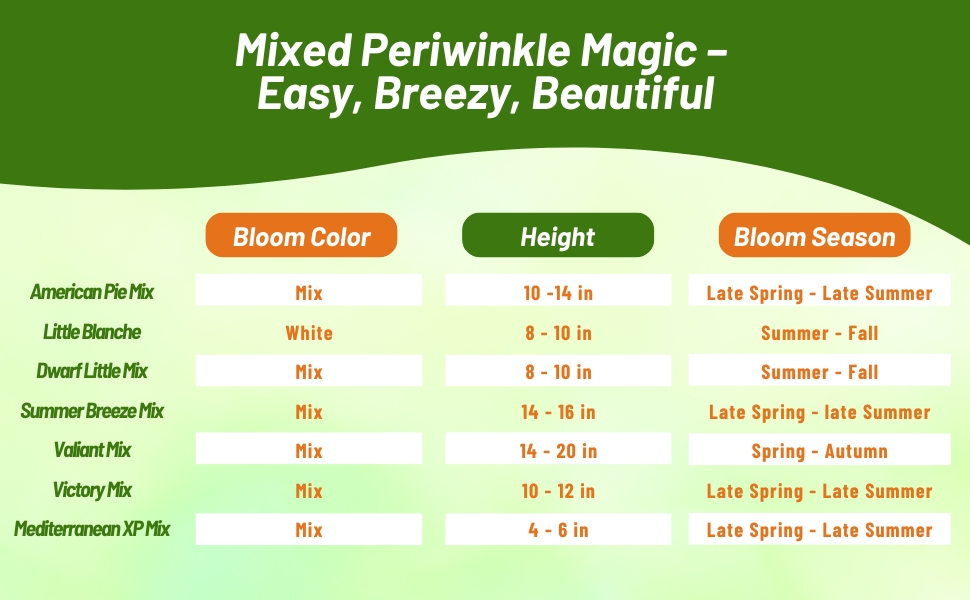
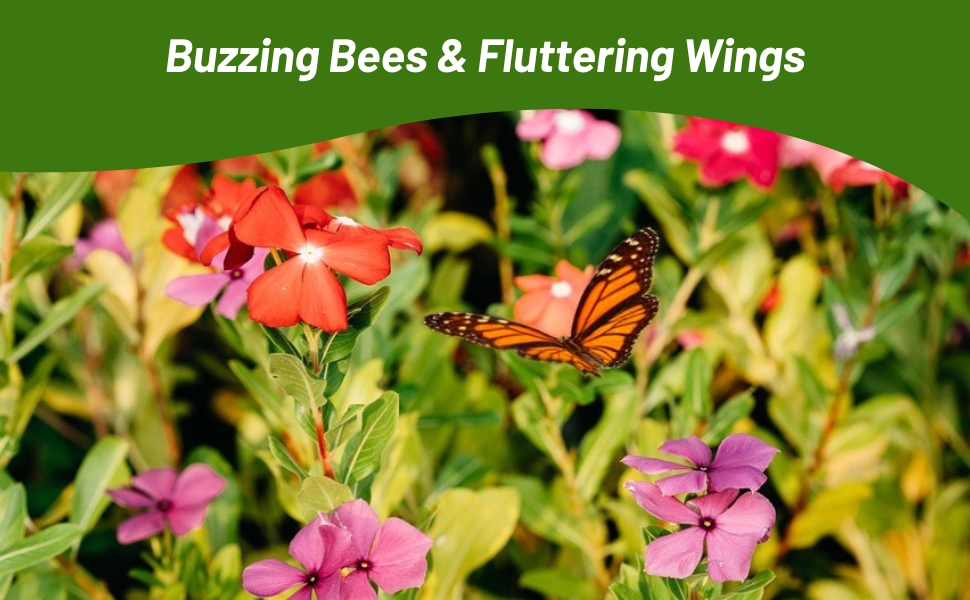
Periwinkle (Catharanthus Roseus Titan Mix Summer Breeze) - Titan summer breeze mix has beautiful shades or lavender, pink, rose, and white. This periwinkle flower seed mixture blooms up to two weeks faster than most other vinca varieties with clear flowers. It has excellent branching and big, vibrant petals. Periwinkle has very low watering needs and is outstanding in sunny, hot and dry conditions. Titan vinca will also grow in light shade. Reaching, 14 - 16 inches in height and only 10 - 12 inches wide, a very good variety for containers, beds, and borders.
Vinca is best grown in full sun areas or areas that get at least 6 hours of direct sunlight a day. Soil should be well drained and these drought tolerant plants do not need a lot of water so be careful not to overwater. Season long blooms bursting with color from late Spring to late Summer for gardens and containers.
Grow Vinca seeds indoors 4 - 6 weeks before the last frost is expected. Cover the Vinca Periwinkle seeds with 1/4 inch of potting mix, spray with water to moisten and press down lightly. Vinca flower seeds will not germinate in any sort of light, so cover trays or containers with a black plastic sheet or a newspaper. Lift the plastic or newspaper regularly to moisten by misting. Once Periwinkle seedlings emerge, they need bright light. At about 2 - 3 inches tall, transplant the strongest plants into individual pots. The plants can be moved outside once the temperature is consistently above 65F degrees. Directly sowing seeds is not recommended, but if you choose to direct sow, follow the same steps as above. Wait until danger of frost has passed and temperatures are consistently warm, and prepare the soil well so that it is light and fine.
Common Questions
How quickly do annual vincas grow and spread?
Very fast. Annual vinca seedlings will reach full-size by mid-summer.
What plants pair well with annual periwinkle?
Plants that complement annual periwinkle enhance the striking eye of the vinca flower. For instance, consider combining white vincas with a burgundy eye alongside burgundy zinnias, or pairing peach vincas featuring a red eye with bold wine-hued celosia plants. Additionally, other heat and sun-loving plants that work well with vinca include moss rose and penta flowers.
How should you use it in your garden?
Utilize the rapid growth habit of annual vinca to enhance your garden. Purchase a six-pack of vinca plants to fill any empty sunny areas in your garden border where your perennials are still growing. Trailing annual vincas, such as the 'Cora Mix', may not take up much space in the soil, but they will gracefully spill over pathways and emerge from leggy shrubs, bringing a vibrant splash of color to your landscape.
Does vinca get downy mildew like impatiens?
No, many gardeners use it as a substitute for impatiens to brighten shady areas because it is not susceptible to downy mildew.
Can I grow in a container?
Absolutely, they are perfect for containers.
Does vinca attract pollinators?
Yes, they attract bees, butterflies and hummingbirds.
















